Brief Papers
| Publication Cover | Title |
|---|---|
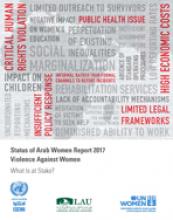 |
Status of Arab Women Report 2017 Violence against Women: What is At Stake E/ESCWA/ECW/2017/2 The study focuses on intimate partner violence and particularly on its economic costs. It reviews evidence-based knowledge and provides in-depth understanding of the human rights and... |
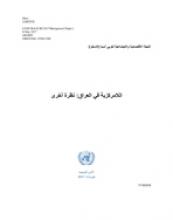 |
Decentralization in Iraq: Another perspective E/ESCWA/ECRI/2017/BACKGROUND PAPER.1 Despite officially adopting a-symmetrical federalism since 2005, Iraq’s state structure has remained high centralized. In light of the emerging consensus that decentralization is imperative for... |
 |
Equality in the New Global Agenda: Integrating a Gender Perspective in the Implementation of Sustainable Development Goals 1 and 2 in the Arab Region E/ESCWA/SDD/2016/TECHNICAL PAPER.2 A close analysis of the 2030 Agenda for Sustainable Development, adopted by the international community in September 2015, reveals that some gender issues should be further emphasized in the... |
 |
Organizations of Persons with Disabilities in the Arab Region: A Preliminary Study E/ESCWA/SDD/2015/Technical Paper.11 Organizations of persons with disabilities (OPDs) represent essential actors at the policy level, and play a key role in the Arab region where inclusion of persons with disabilities is a high... |
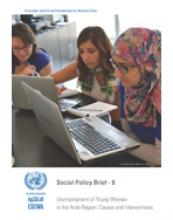 |
Unemployment of Young Women in the Arab Region: Causes and Interventions, Social Policy Brief, No. 8 E/ESCWA/SDD/2015/Brief.8 This policy brief unveils the underlying causes and consequences of young women’s unemployment in the region and warns that the inability of young women to reach into the labour market, would... |
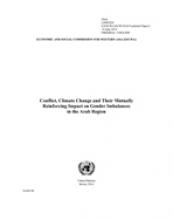 |
Gender, Climate Change and Conflict: Mutually Reinforcing Impact on Gender Imbalances in the Arab Region, 2016 E/ESCWA/ECW/2016/Technical Paper.2 The present policy brief analyses the impacts of conflict and climate change on gender imbalances in the Arab region. It shows how conflict and climate change fortify one another, creating a... |
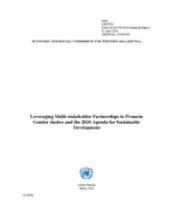 |
Leveraging Multi-stakeholder Partnerships to Promote Gender Justice and the 2030 Agenda for Sustainable Development E/ESCWA/ECW/2016/TECHNICAL PAPER.1 Ambitious multi-stakeholder partnerships are an important aspect of the 2030 Agenda for Sustainable Development and will be critical to its success. They will... |
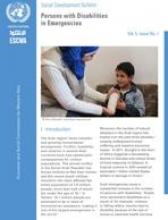 |
Social Development Bulletin: Persons with Disabilities in Emergencies Vol. 5, Issue No. 1 E/ESCWA/SDD/2014/PAMPHLET.4 Persons with disabilities are among the most vulnerable in humanitarian crises. They are often left behind when people flee, and face significant barriers in accessing humanitarian assistance and... |
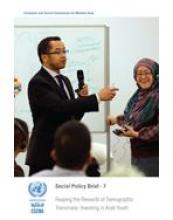 |
Reaping the Rewards of Demographic Transitions: Investing in Arab Youth, Social Policy Brief, No. 7 E/ESCWA/SDD/2014/BRIEF.7 This policy brief focuses on the urgency of investing in youth development in order to reap the rewards of the demographic dividend in many Arab countries. It discusses the tools and policy... |
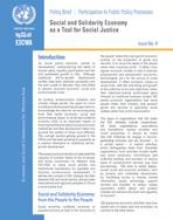 |
Social and solidarity economy as a tool for social justice, policy brief, No.4 E/ESCWA/SDD/2014/Brief.4 This brief aims at building the capacity of member States to adopt social policies and institutional mechanisms for equitable and inclusive socioeconomic development. It defines the concept of... |
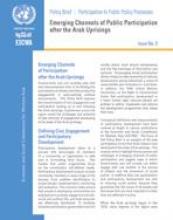 |
Emerging Channels of Public Participation after the Arab Uprisings, policy brief, No. 3 E/ESCWA/SDD/2014/Brief.3 Governments and civil societies play vital and interconnected roles in facilitating the participation of citizens and their productive engagement in post-uprising political environments. This... |
 |
Participation and Civic Engagement Policy Brief Series: Policy Brief One Participation And Transitional Justice E/ESCWA/SDD/2013/Technical Paper.5 This policy brief discusses the central role of civic engagement and civil society in forging transitional justice mechanisms. Using international case studies, it outlines the general instruments... |
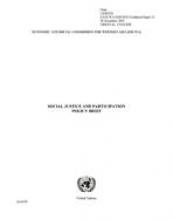 |
Social justice and participation: Policy brief E/ESCWA/SDD/2013/Technical Paper.12 This brief lays out the definition and principles of social justice and discusses relevant global examples of effective mechanisms and tools to achieve a just society, based on the premise that... |
 |
Migration and the post-2015 development agenda - Policy brief 19 E/ESCWA/SDD/2013/Technical Paper.11 This policy brief summarizes the record on references to migration in development agendas pursued by the United Nations, before going on to examine how the various processes and actors involved in... |
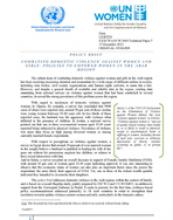 |
Combating domestic violence against women and girls: Policies to empower women in the Arab region E/ESCWA/ECW/2013/Technical Paper.7 This policy brief addresses domestic violence in the Arab region, within the context of family, and is based on a recent flagship study, jointly prepared by ESCWA and UN-WOMEN, in... |
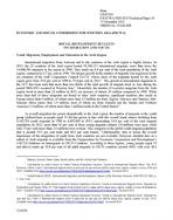 |
Social Development Bulletin on Migration and Youth This bulletin provides a brief overview on youth and migration in Arab countries. It provides a statistical account of youth migration flows, highlighting the central role of labour migration in... |
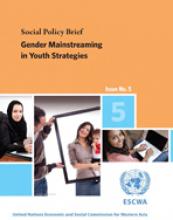 |
Social Policy Brief - Gender Mainstreaming in Youth Strategies - Issue No. 5 E/ESCWA/SDD/2011/Technical Paper.4 |
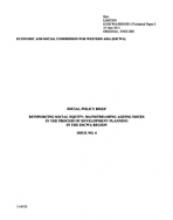 |
Reinforcing Social Equity: Mainstreaming Ageing Issues in the Process of Development Planning in the ESCWA Region, Social Policy Brief, No. 4 E/ESCWA/SDD/2011/Technical Paper.2 This brief was issued in 2012, on the occasion of the second review and appraisal of the Madrid International Plan of Action on Ageing (MIPAA). It emphasizes the need to integrate ageing issues... |
 |
Achieving Social Justice for All, Social Development Bulletin, Vol.3, No. 1 E/ESCWA/SDD/2010/Technical Paper.2 This issue of the Social Development Bulletin indicates that the progress made in the economic sphere in recent years was not enough to reduce inequality and social exclusion. To the contrary,... |
 |
Social Policy Brief, Issue No.3, International Migration of Youth in Arab Countries E/ESCWA/SDD/2009/Technical Paper.7 This brief deals with youth migration in Arab countries, as it reviews the reasons of this migration as well as the different mechanisms of its administration. In recent decades, Arab countries... |





